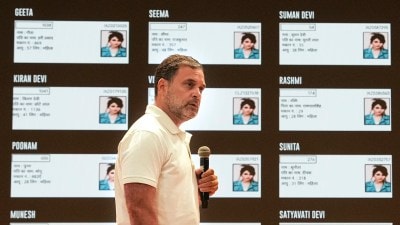Best time to de-communalise politics
Should Indian Muslims oppose the Indo-US nuclear deal just because it involves America, the presumed “enemy of Muslims worldwide”?

Should Indian Muslims oppose the Indo-US nuclear deal just because it involves America, the presumed “enemy of Muslims worldwide”? Conversely, should Hindus support the deal just because Muslims may be opposing it?
The supporters and opponents of the deal have presented many political and technical arguments in the debate so far. However, one argument that is rarely made in public forums, although it does figure in private conversations, is what is captured in the above-mentioned questions. When you speak the unspeakable in politics, including that which may be true, you invite controversy. And this is the fate that befell M K Pandhe, a member of the CPI(M)’s politburo, last week. Pandhe, who heads the CPI(M)-affiliated Centre of Indian Trade Unions (CITU), is not known to make public pronouncements outside his domain of work, and trade union-related issues rarely catch the media attention these days. Therefore, when he warned the Samajwadi Party that it would lose its Muslim vote by supporting the nuclear deal, he put himself and his party in a spot. The SP protested strongly and even the CPI(M) chief, Prakash Karat, quickly disowned his colleague’s remarks.
This episode should prompt an honest discussion among political activists on the perils of communalising our foreign policy. It is wrong for any political party to oppose India’s engagement with the United States on the calculation that doing so might alienate its Muslim supporters. By the same logic, it is wrong for any section of the Muslim society to oppose the nuclear deal, or any other aspect of Indo-US cooperation simply because, on a pan-Islamic consideration, America is viewed as the foe of Islam and the Ummah.
Another example. For a long time, several political parties opposed establishment of full diplomatic relations between India and Israel, their unstated reason being the fear of losing “Muslim support”. The fear was not without basis since many Muslim organisations were — and continue to be — hostile to India’s diplomatic ties with Israel for pan-Islamic considerations.
Such communal outlook is not limited to Muslims alone. Many Hindus have asked me, “Why is the BJP opposed to the nuclear deal with America? Hindus should support George Bush because he is acting tough with the Muslim world. Look how he got rid of Saddam Hussein.” The same people are also averse to the idea of a joint Iran-Pakistan-India gas pipeline project.
Whether we are Hindus or Muslims, our stand on foreign policy issues should be determined solely by what is in India’s national interest. Thus, as this column has repeatedly argued, the nuclear deal deserves to be opposed because it is unequal in nature and compromises India’s strategic nuclear defense. Similarly, India should be friendly with both Arab nations and Israel because that is the right thing to do. Energy cooperation with Iran is good for India because we need to enhance our energy security and Iran, which has been our civilisational neighbour since time immemorial, has ample natural gas to offer. It is the duty of all political parties to educate the people that issues like these should not be viewed through the prism of communal prejudices.
But is it only the foreign policy domain that needs to be de-communalised? What about communalisation of domestic politics? Parties that call themselves defenders of secularism routinely base their policies and perspectives on whether they would be able to retain or regain their “minority” votebank. They habitually brand the BJP as communal because it helps them to scare away religious minorities from the party. The BJP, in turn, has not been sufficiently sensitive to the legitimate Muslim needs and concerns, the operative logic, which is never stated publicly, being: “Why should we reach out to Muslims when they are anyway not going to vote for us? We might even alienate our core voters by doing so.” This BJP-Muslim divide has helped neither the BJP nor the Indian Muslims. Nevertheless, it has endured for want of a bold initiative from either side.
However, now is the best time to de-communalise politics, both in its external and domestic dimensions. The so-called “secular unity” between the Congress-led UPA and the Left parties is in tatters. At least publicly, parties like the CPI(M) and the SP have had to distance themselves from the “Muslim Card” in the debate on the Indo-US nuclear deal. The UPA Government has become so unpopular that the BJP need not base its election strategy on its narrow Hindu-only constituency. It has the best chance today to devise a genuinely secular pan-Indian agenda capable of attracting even Muslims and Christians. By doing so, it can emerge as a worthy successor to a rapidly shrinking Congress.
There are signs of “new thinking” among Muslims and Christians, too. In Bihar, the strong Muslim support for Nitish Kumar, an ally of the BJP, is a case in point. Thus, the BJP, along with its partners in the NDA, has the best opportunity to recreate the magic of 1977 when the Janata Party, despite having the Jana Sangh as its principal constituent, was able to win widespread Muslim support. Clearly, the nuclear deal has had one good fallout. Even in ensuring the UPA Government’s looming collapse, it has opened up many positive possibilities for politics in India.
Write to:sudheenkulkarnigmail.com



- 01
- 02
- 03
- 04
- 05




























